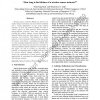Free Online Productivity Tools
i2Speak
i2Symbol
i2OCR
iTex2Img
iWeb2Print
iWeb2Shot
i2Type
iPdf2Split
iPdf2Merge
i2Bopomofo
i2Arabic
i2Style
i2Image
i2PDF
iLatex2Rtf
Sci2ools
AINA
2009
IEEE
2009
IEEE
How Long is the Lifetime of a Wireless Sensor Network?
Wireless sensor networks (WSNs) are known to be highly energy-constrained and each network’s lifetime has a strong dependence on the nodes’ battery capacity. As such, the network lifetime has been a critical concern in WSN research. While numerous energy-efficient protocols have been proposed to prolong the network lifetime, various definitions of network lifetime have also been used for the different scenarios and protocols. The lifetime of a sensor network is most commonly defined as the time to the first sensor node failure – seemingly over-pessimistic in many envisaged deployment scenarios. While other definitions exist, there has not been any consensus on which quantitative lifetime definition is most useful. In this paper, we aim to provide as objectively as possible, a comparative study of WSN protocols based on various network lifetime definitions. We also discuss the implications of these metrics and their applicability in evaluating the effectiveness of WSN data delive...
Related Content
| Added | 09 Jul 2010 |
| Updated | 09 Jul 2010 |
| Type | Conference |
| Year | 2009 |
| Where | AINA |
| Authors | Nok Hang Mak, Winston Khoon Guan Seah |
Comments (0)

